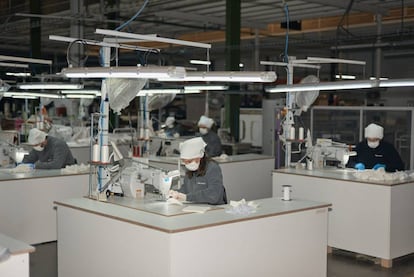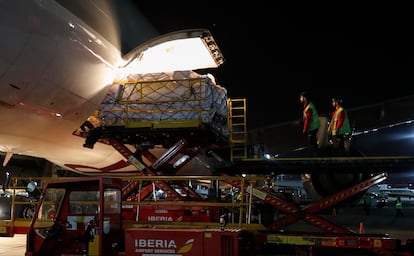Bidding wars and scammers: The new life of healthcare procurement officials in Spain
The coronavirus crisis has turned an anodyne administrative procedure into a high-pressure job as regional governments scramble to secure medical supplies on the international market
Luis Ruiz, secretary general of health services in the Spanish region of Castilla-La Mancha, has been getting very little sleep of late. His time is spent going back and forth between two very different time zones: the Spanish one and the Chinese one.
Like other procurement officials in charge of purchasing medical supplies, he has been following the advance of the Covid-19 epidemic in Spain with a feeling of anguish. The crisis caught the country unprepared, without enough reserves of personal protective equipment (PPE), testing kits or ventilators.
Before he knew it, the act of buying face masks, gowns and safety glasses had become a risky game of trial and error that nobody was prepared for. “We are at war. The goal is to emerge from this with as little damage as possible,” notes Ruiz.
Before the coronavirus turned the world upside down, purchasing medical supplies had been an anodyne administrative procedure. A hospital or health service would put out a tender, suppliers would make their offers and one of them would be selected, generally the one offering the best price for similar quality. There was always enough stock, and suppliers would deliver orders within 48 or 72 hours.
We are at war. The goal is to emerge from this with as little damage as possibleLuis Ruiz, Castilla-La Mancha procurement official
Until recently, according to the health technology industry association Fenin, Spain was purchasing nearly €8 billion a year in medical supplies from the Spanish subsidiaries of multinationals like Siemens, Roche, Medtronic and Dräger. There were also a few smaller suppliers with decades of experience, such as Distribuciones Levantinas Sanitarias (Dilesa) from Paterna, in the region of Valencia.
But by mid-February, the main multinationals began running out of stock. Production could not keep up with demand. And many countries of origin started to ban exports of medical supplies, according to an industry professional.
The Spanish government decided to centralize purchases through a decree that stopped short of prohibiting regional authorities from procuring their own supplies, but slowed them down. Deaths began to spike, and so did transmission among healthcare workers. Hospitals and senior residences found themselves without enough protective gear. On March 14, the government declared a state of alarm and introduced a strict lockdown.
By then, procurement officials from all over the world were already competing with one another to get their hands on medical supplies. New middlemen and companies with ties to China emerged. The notion of centralized government purchasing began to crumble. It became a case of each man for himself.
China, the new El Dorado

Before Covid-19, the medical supply needs of a country like Spain were evenly divided into two categories: health technology, and items produced in large numbers (face masks, gloves, gowns), explains Luis Furnells, president of Oesía Group, an IT engineering and consultancy firm. But now, the second category has grown to represent 80%.
National production of face masks comes nowhere near covering domestic demand. There are only two factories: Diseños NT in Alcalá la Real (Jaén), which makes 80,000 surgical masks a day, and Sibol in Zamudio (Bizkaia), which makes 16,000 FFP3 masks – the highest level of protection – a day.
The reason that so few are being made in Spain is that they are cheaper to import than to manufacture, since the profit margin is very small. The production of perishable medical supplies was outsourced years ago, and China became the top manufacturer. This leadership has been reinforced during the coronavirus pandemic, with China accounting for 85% of the global production of face masks, according to investment banking company Morgan Stanley.
“Right now, even textile companies in China that are able to do so are converting themselves into face mask manufacturers,” explains the head of a major Spanish firm with a presence in China, speaking on condition of anonymity.
“The same guy who used to sell you a yacht or electric motorcycles is now offering you face masks,” adds an entrepreneur from Seville who has factories in China. And sellers are demanding advance payment on the orders. “It’s 50% when you place the order and the other 50% when it’s manufactured, not when we receive it,” explains Luis Ruiz.
“I have a contact”

Together with the new suppliers, a whole set of middlemen and brokers began to knock on the doors of regional health departments and hospitals, offering them protective gear. “Everyone has a friend who in turn has a contact in China,” notes Ruiz. “We are receiving 100 offers a day for medical supplies, and this figure probably falls short.”
Many of these offers are bona fide, but others are questionable. All of them are expensive. Surgical masks that used to sell for €0.027 cannot be obtained these days for under €0.40, and sometimes up to a whole euro.
“The price hike has been spectacular. In normal situations we would never approve it, but right now we have no choice but to accept them at that price,” adds Ruiz. The price probably conceals commissions for intermediaries, but there is no way of knowing for sure.
“Ordinary suppliers are doing what they can, but the market is much tougher now and they’re having a lot of trouble,” adds Sara Manjon, director of the Area of Professionals and Organizations at the Catalan Health Service (CatSalut). “Other suppliers have stepped in and you don’t know who the manufacturer is. They’re just salespeople, and you need to do some vetting.”
A private manager said that he recently received two offers on the same day for FFP2 face masks, one for €3.5 a unit, and another one for €6. Before the crisis, these masks could be bought at any local pharmacy for €2.5. Their price has been as high as €9 since then. A 50-unit box of surgical masks that used to cost €2.50 at the most is now going for up to €5. And a 100-unit box of gowns that was once sold for €45 is now selling for €65 to €80.
“Excess demand has not only stressed the factories, but also the transportation routes,” notes Furnells. “There are fistfights to get your own supplies loaded onto cargo aircraft.”
This also means that the cost of air transportation has quadrupled: a cubic meter of cargo space on a flight between a Chinese city and Madrid used to cost around two euros per kilogram. This is now around €14 and “nobody guarantees that it will arrive on time,” adds Michael Voss, director general of a Bilbao-based logistics company named Sparber, which has offices in Shanghai.
New laws introduced in China to guarantee the quality of exports has contributed to slowing down the process, says Furnells. “It leaves out those who were planning to get rich quick, but it stresses the entire chain of logistics.”
In these conditions, predicting the day that a shipment will arrive gets complicated. That is why Oesía, Fenin and the airline Iberia have set up a Madrid-Shanghai airlift service with three flights a week. In the last two weeks, these flights have brought 16 million face masks and two million units of other PPE to Spain.
Corporate help
In the northwestern region of Galicia, the multinational Inditex – owner of the fashion brand Zara – is assisting the regional government with purchases and logistics. Galicia is also attempting to encourage local production of simple products that are in high demand, such as surgical masks, and it has placed orders with up to six local companies. Regional authorities in Castilla-La Mancha and La Rioja have made similar moves. In the town of Arnedo, shoemaking companies are now making reusable gowns, and in Ezcaray, businesses that manufactured seats for auditoriums are now making plastic aprons.
Several sources consulted for this story said they believe that the government’s lack of experience may explain why it recently purchased 640,000 defective fast tests that it was forced to return to China. The Health Ministry, which has declined to comment, has yet to reveal the name of the “Spanish distributor” that it bought the shipment from, or for how much money.
There are some perfectly good certificates, and others that are shamelessly phonyJavier Díaz, Asepal
“Any region, even a large hospital, handles more purchases than them,” says a regional source, suggesting the central government was not ready to deal with the situation. “If we’d just sat and waited for the government to buy material in a centralized way, we’d have all been in chaos for three weeks, we’d be in a situation of total tragedy.”
The middlemen who have popped up during the crisis “shoot at everything that moves,” says Antonio Sanchís, manager of a distribution company named Dilesa that managed to import 100 respirators from Turkey despite Ankara’s veto on exports. And these brokers make the most of the “despair” of hospital managers.
The Valencia region was the first of Spain’s autonomous communities to manage to charter an entire plane of medical supplies. The last one flew in 60 tons of equipment. “It would have been good for Europe to use its weight to set a price for purchases,” notes the regional premier, Ximo Puig. “But after that we were no longer in that scenario. We needed supplies no matter what.”
Avoiding scams
Avoiding scams has become a priority for regional procurement officials. Alex Arriola, director general of a Basque business development agency named SPRI, says he has acted in an advisory capacity to prevent several regions from getting fleeced. With seven years of experience as chief of purchasing for several industries in China, he has a reliable network of contacts. “I know there are governments and companies that have tried to steal our products,” he says. The trick resides in offering two to three times the amount of money for a shipment that has already been paid by another client.
Javier Díaz, technical chief for Asepal, an association of personal protective equipment, has been testing the quality and authenticity of around 100 shipments from China since the beginning of the coronavirus crisis. He found that 60% had false certification, and stopped the imports in time. “There are some perfectly good certificates, and others that are shamelessly phony,” he says. “But with this volume of imports, it is impossible to have total control. The Netherlands also ended up with 600,000 deficient face masks.”
Díaz says that some Chinese labs that issue quality certificates have created webpages to help European authorities and companies avoid fraud. “With these websites, it is easy to find out if a factory or product has the official certification,” he says.
With reporting by Ferran Bono, Jessica Mouzo, Ignacio Zafra, Juan Navarro, Javier Martín-Arroyo, Sonia Vizoso, Juan José Mateo and José Marcos.
English version by Susana Urra.
Tu suscripción se está usando en otro dispositivo
¿Quieres añadir otro usuario a tu suscripción?
Si continúas leyendo en este dispositivo, no se podrá leer en el otro.
FlechaTu suscripción se está usando en otro dispositivo y solo puedes acceder a EL PAÍS desde un dispositivo a la vez.
Si quieres compartir tu cuenta, cambia tu suscripción a la modalidad Premium, así podrás añadir otro usuario. Cada uno accederá con su propia cuenta de email, lo que os permitirá personalizar vuestra experiencia en EL PAÍS.
¿Tienes una suscripción de empresa? Accede aquí para contratar más cuentas.
En el caso de no saber quién está usando tu cuenta, te recomendamos cambiar tu contraseña aquí.
Si decides continuar compartiendo tu cuenta, este mensaje se mostrará en tu dispositivo y en el de la otra persona que está usando tu cuenta de forma indefinida, afectando a tu experiencia de lectura. Puedes consultar aquí los términos y condiciones de la suscripción digital.








































